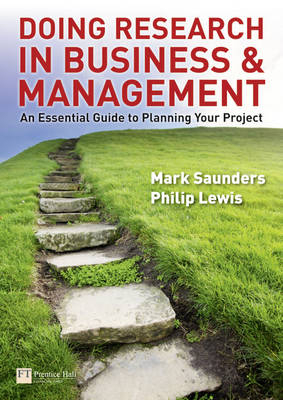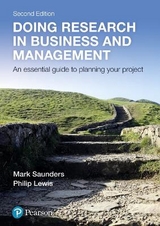
Doing Research in Business and Management
FT Press (Verlag)
978-0-273-72641-8 (ISBN)
- Titel erscheint in neuer Auflage
- Artikel merken
Contents
Guided tour
Authors
About this book
1 Choosing your research topic
1.1 Why you should read this chapter
1.2 Why choosing the right research topic is important
1.3 Why choosing the right research topic is difficult
1.4 Ten ways to generate ideas for a research topic
1.5 How to refine research topic ideas
1.6 What makes a good research topic?
1.7 How to turn a research idea into a research project
1.8 Summary
1.9 Thinking about your research
2 Reviewing the literature
2.1 Why you should read this chapter
2.2 What a literature review is
2.3 Why it is important to review the literature
2.4 The types of literature available to you
2.5 Searching for and obtaining the literature
2.6 Evaluating the usefulness of literature to your research
2.7 Reading, noting and correctly referencing useful literature
2.8 Writing your literature review
2.9 Summary
2.10 Thinking about your critical literature review
3 Managing the research process
3.1 Why you should read this chapter
3.2 Getting access to your research organisation and your respondents
3.3 What about access to information?
3.4 Six strategies for making sure you get the organizational access you want
3.5 Managing yourself
3.6 Managing your supervisor
3.7 Managing your university
3.8 The ethics of doing research
3.9 Summary
3.10 Thinking about the research process
4 Using secondary data
4.1 Why you should read this chapter
4.2 What forms does secondary data take?
4.3 Why you should use secondary data the potential?
4.4 What are the pitfalls of using secondary data?
4.5 Assessing the suitability of secondary data
4.6 Where and how to find secondary data
4.7 Summary
4.8 Thinking about using secondary data
5 Choosing your research design
5.1 Why you should read this chapter
5.2 The importance of research philosophy
5.3 Differing approaches to research: deduction and induction
5.4 Differing types of studies: exploratory, descriptive or explanatory studies
5.5 Differing types of strategies
5.6 Making sure your research conclusions are believable
5.7 Summary
5.8 Thinking about your research design
6 Collecting data
6.1 Why you should read this chapter
6.2 Selecting samples
6.3 Collecting data using questionnaires
6.4 Collecting data using semi structured or unstructured interviews
6.5 Summary
6.6 Thinking about collecting data
7 Analysing data
7.1 Why you should read this chapter
7.2 What are different types of data?
7.3 Analysing data quantitatively
7.4 Analysing data qualitatively
7.5 Summary
7.6 Thinking about analysing data
8 Writing and presenting the research proposal
8.1 Why you should read this chapter
8.2 Why is the research proposal so important?
8.3 When should I write my research proposal?
8.4 What should I include in my research proposal?
8.5 In what style should my research proposal be written?
8.6 How will my research proposal be judged?
8.7 Summary
8.8 Thinking about your research proposal
Bibliography
Index
| Sprache | englisch |
|---|---|
| Maße | 174 x 241 mm |
| Gewicht | 416 g |
| Themenwelt | Wirtschaft ► Betriebswirtschaft / Management ► Allgemeines / Lexika |
| Wirtschaft ► Betriebswirtschaft / Management ► Unternehmensführung / Management | |
| ISBN-10 | 0-273-72641-2 / 0273726412 |
| ISBN-13 | 978-0-273-72641-8 / 9780273726418 |
| Zustand | Neuware |
| Informationen gemäß Produktsicherheitsverordnung (GPSR) | |
| Haben Sie eine Frage zum Produkt? |
aus dem Bereich



